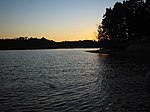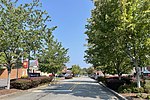Edward M. Rozzell House
Houses completed in 1880Houses in Charlotte, North CarolinaHouses on the National Register of Historic Places in North CarolinaMecklenburg County, North Carolina Registered Historic Place stubsNational Register of Historic Places in Mecklenburg County, North Carolina

Edward M. Rozzell House is a historic home located near Charlotte, Mecklenburg County, North Carolina. It was built about 1880, and is a two-story, three-bay, frame I-house with a kitchen ell. It has a side-gable roof and stucco covered brick end chimneys. Also on the property are the contributing corn crib (c. 1900) and single-pen log barn (c. 1880).It was listed on the National Register of Historic Places in 2005.
Excerpt from the Wikipedia article Edward M. Rozzell House (License: CC BY-SA 3.0, Authors, Images).Edward M. Rozzell House
Old Rozzelles Ferry Road, Charlotte
Geographical coordinates (GPS) Address External links Nearby Places Show on map
Geographical coordinates (GPS)
| Latitude | Longitude |
|---|---|
| N 35.336388888889 ° | E -80.965 ° |
Address
Old Rozzelles Ferry Road 11647
28214 Charlotte
North Carolina, United States
Open on Google Maps






